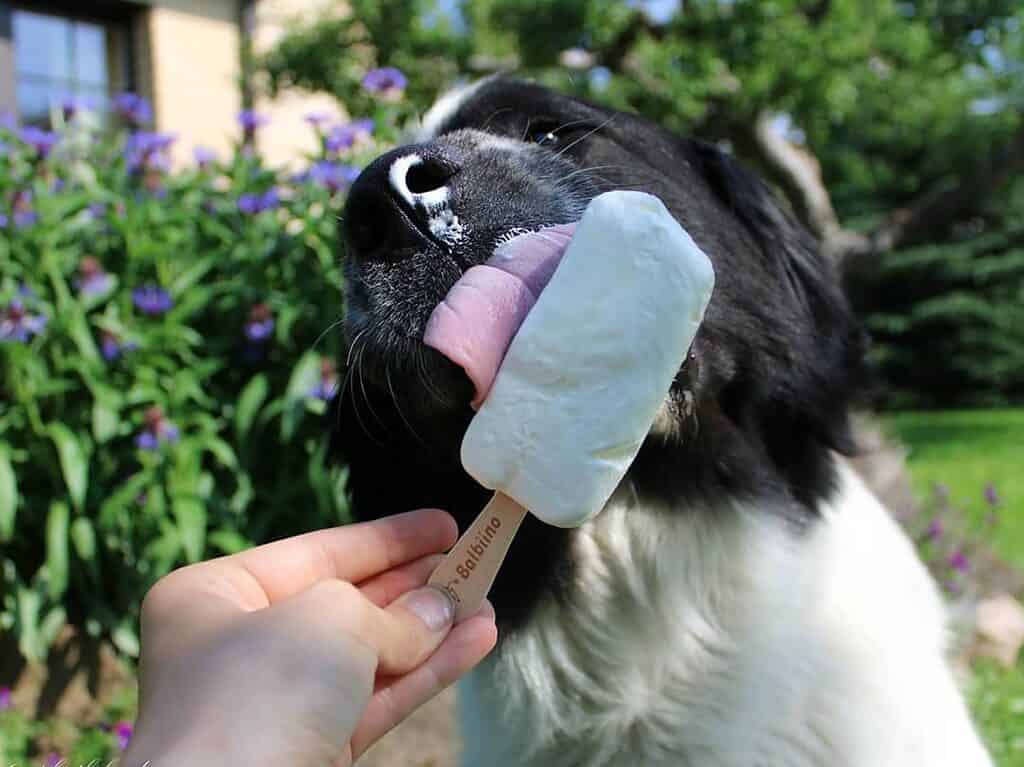What could be better than a warm summer day spent lounging in the backyard with your dog? You reach for the freezer and take out a tub of vanilla ice cream — could it be possible to share this sweet treat with Fido.
Whether or not you can feed your dog vanilla ice cream has been asked countless times, so let’s answer the question once and for all: can dogs eat vanilla ice cream?

Is Vanilla Ice Cream Safe for Dogs?
The answer is yes, but with a few caveats. Dogs should only consume small amounts of vanilla ice cream. This frozen dessert contains sugar and fat, which could lead to obesity in dogs if consumed in large quantities over time. Dairy-based treats like this can also be hard for some pups to digest, resulting in an upset stomach or other digestive issues.
In short, dogs can only indulge in a few licks of vanilla ice cream as a special treat.
When Is Vanilla Ice Cream Not Safe For Dogs To Eat?
When your dog is lactose intolerant.
You may have heard of the term “lactose intolerance” and wondered if it applies to dogs. And yes, it does!
It is an inability to properly digest lactose, a sugar in dairy products. Not all dogs suffer from this condition, but for those who do, it can be very uncomfortable for them.
Understand that lactose intolerance is not the same thing as a food allergy. Though both involve gastrointestinal discomfort after consuming dairy foods, they’re triggered by entirely different mechanisms.
An allergy to dairy products is an immune system reaction that can cause hives, swelling, and panting. Lactose intolerance occurs when the body has difficulty producing enough lactase enzymes necessary to break down lactose when consumed. This leads to throwing up, bloating, and diarrhea but does not produce an allergic response from the body’s immune system.
If your dog keeps vomiting and has a bad case of the runs right after licking up a scoop of vanilla ice cream, keep close tabs on your dog. Look out for any signs of dehydration or lethargy. If the vomiting and diarrhea persist or their condition worsens, don’t hesitate to contact a veterinarian who can provide professional advice and determine whether medical attention is necessary.
When your dog is diabetic.
Vanilla ice cream can contain added sugar and carbohydrates, making it one of the worst treats you could give a diabetic pup. Not only that, but many commercial ice creams contain artificial sweeteners that can adversely affect dogs with diabetes.
To ensure your pup’s safety, swap out vanilla ice cream with healthier options like plain low-fat yoghurt and frozen fruits (pineapples, bananas, watermelons, strawberries, blueberries, and apples).
When your dog is already overweight.
Vanilla ice cream contains high amounts of sugar and fat, which can easily contribute to further weight gain in an already overweight pup. It also increases the risk of diabetes, kidney disease, digestive problems, liver problems, pancreatitis, and dental problems.
When your dog has a history of gastrointestinal issues.
Unfortunately, if your pup has a history of gastrointestinal issues, the vanilla ice cream’s ingredients, such as sugar and dairy, can wreak havoc on a sensitive stomach.
When vanilla ice cream contains artificial sweeteners like xylitol.
Xylitol is a sugar substitute often used in human products such as candy and gum, but unfortunately, it can be toxic to pups. Xylitol causes a sudden drop in blood sugar levels and can also cause liver failure when ingested by animals. Therefore, if your pooch comes across some of your tasty vanilla ice creams with added xylitol, they should never take a lick.
How To Safely Serve Ice Cream To Dogs?

Skip ice cream with artificial sweeteners, macadamia nuts, coffee, chocolate, grapes, or raisins.
First, ensure that whatever ingredients you use are 100% dog friendly. Avoid anything with added sugars, artificial flavourings or preservatives, as this could cause an upset tummy. Making homemade ice cream can ensure your dog has the healthiest snack possible; there are plenty of recipes online that are perfect for any pooch’s palate.
Keep portion sizes in check!
And don’t forget the portion size! Dogs should only have small amounts of ice cream at once; a few licks will do the trick.
Can Dogs Eat Other Vanilla Treats?
Vanilla Yogurt
Vanilla yoghurt is packed with protein, calcium, vitamins and probiotics that benefit a pup’s digestive system. This creamy treat can also be used to help administer medications or supplements since it has irresistible flavor dogs love.
Opt for plain yoghurt with no added sugar or artificial sweeteners for the healthiest option.
Vanilla Cake
The answer is more complex than yes or no, as it depends on the ingredients used in the cake.
Dogs can enjoy a small piece of cake made with simple ingredients like flour, sugar, eggs, and butter. The danger lies in additional toppings like marshmallows and whipped cream, equating to extra sugar and calories.
Additionally, many store-bought vanilla cakes contain artificial sweeteners that should also be avoided due to the potential for digestive problems or allergic reactions if ingested by your pup.
Can Dogs Eat Other Ice Cream Flavors?
Chocolate Ice Cream
As much as our furry friends may beg and plead for this cold treat, dogs cannot eat chocolate ice cream.
Chocolate contains theobromine, an ingredient that’s toxic to dogs. It affects their cardiovascular and nervous systems, which means a scoop of chocolate ice cream can cause chocolate poisoning. Symptoms include anything from vomiting and diarrhea to seizures and even death.
So how long does it take a dog to get ill after eating chocolate ice cream? Depending on how much was consumed and the size of your dog, symptoms could start as early as 5 hours after ingestion or may even take up to 12 hours to manifest themselves.
Matcha Ice Cream
This green tea-flavored treat contains several ingredients that can spell trouble for pooches. That’s right, you guessed it: caffeine! Ingesting large amounts of caffeine can lead to anything from nausea and vomiting to seizures and even death if left untreated.
And then there’s sugar, which is also on the list of no-no foods for dogs.
Strawberry Ice Cream

Not only can dogs safely consume strawberry ice cream, but they may even benefit from some of its nutritious properties. Strawberries provide dogs with vitamins and minerals like Vitamin C and fiber.
Vegan Ice Cream
Just because something is vegan doesn’t automatically make it safe for your dog. Remember that some of the ingredients in vegan ice cream, mainly those containing nuts, can be toxic to dogs and should always be avoided.
Unfortunately, there are no shortcuts that pet owners can take when selecting vegan treats for their furry friends; if you want to feed your pup something special, you’ll need to check the label closely. Nut-based milk, such as almond and cashew milk, is often used in vegan ice creams.
Ice Cream With Grapes and Raisins
Grapes and raisins may have health benefits for humans, but these fruits are far too dangerous for our furry friends, even at small doses.
These fruits are highly toxic to their systems. The toxicity reaction can range from mild gastrointestinal issues such as vomiting and diarrhea to life-threatening kidney failure.
References
Finlay, F., & Guiton, S. (2005). Chocolate poisoning. BMJ, 331(7517), 633.
Bates, N. (2015). Chocolate toxicity. Companion Animal, 20(10), 579-582.
Piscitelli, C. M., Dunayer, E. K., & Aumann, M. (2010). Xylitol toxicity in dogs. Compend Contin Educ Pract Vet, 32(2), E1-E4.




